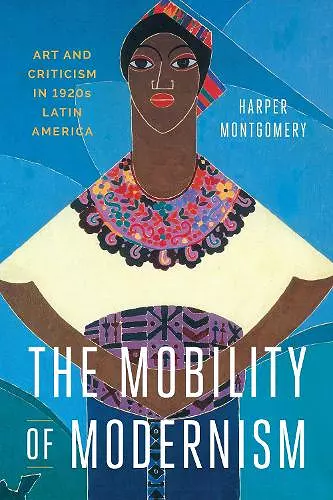The Mobility of Modernism
Art and Criticism in 1920s Latin America
Format:Paperback
Publisher:University of Texas Press
Published:4th Jul '17
Currently unavailable, and unfortunately no date known when it will be back

"Deeply researched and passionately argued, this book is a model for effective transnational scholarship. Much like her protagonists, Montgomery is a visionary." -- Tatiana Flores, Rutgers University, author of Mexico's Revolutionary Avant-Gardes: From Estridentismo to !30-30! "This book represents the foremost edge (the vanguard, if you will) of the history of Latin American art. Montgomery's approach is highly original in its conception and even daring in the choice and range of artists and sites examined, and her interpretive framework (anticolonialism and retelling modernism) is very timely." -- Adriana Zavala, Tufts University, author of Becoming Modern, Becoming Tradition: Women, Gender, and Representation in Mexican Art
Presenting a paradigm-shifting view of early Latin American modernism, this book looks at how a transnational intellectual community of writers and critics forged an anticolonial aesthetic based in abstract artistic forms.
Arvey Foundation Book Award, Association for Latin American Art, 2018
Many Latin American artists and critics in the 1920s drew on the values of modernism to question the cultural authority of Europe. Modernism gave them a tool for coping with the mobility of their circumstances, as well as the inspiration for works that questioned the very concepts of the artist and the artwork and opened the realm of art to untrained and self-taught artists, artisans, and women. Writing about the modernist works in newspapers and magazines, critics provided a new vocabulary with which to interpret and assign value to the expanding sets of abstracted forms produced by these artists, whose lives were shaped by mobility.
The Mobility of Modernism examines modernist artworks and criticism that circulated among a network of cities, including Buenos Aires, Mexico City, Havana, and Lima. Harper Montgomery maps the dialogues and relationships among critics who published in avant-gardist magazines such as Amauta and Revista de Avance and artists such as Carlos Mérida, Xul Solar, and Emilio Pettoruti, among others, who championed esoteric forms of abstraction. She makes a convincing case that, for these artists and critics, modernism became an anticolonial stance which raised issues that are still vital today—the tensions between the local and the global, the ability of artists to speak for blighted or unincorporated people, and, above all, how advanced art and its champions can enact a politics of opposition.
Montgomery is persuasive in showing the part played by magazines in the circulation of art and criticism in Spanish America. * Hispanic American Historical Review *
While Montgomery treats artists and media that are well known among scholars alongside others that are not, the real contribution of her study lies in how she teases out the discrete ways that the meaning of the same artist's work or a common medium was constituted in different metropolitan contexts, to articulate not a unified regional aesthetic but rather modalities of 'American' art that were articulated to specific national cultures. * Latin American Research Review *
[An] ambitious, far-ranging study…valuable for understanding debates about art and society that continue through post World War II era modernist movements and beyond. * The Americas *
[The Mobility of Modernism] is a valuable addition to the literature on Latin American modernism, providing a close reading of visual sources and the specificities of the shifting contexts in which they were produced and received…The text is intelligently written, with lucid explanations and insightful conclusions. By expanding the history of modernism to include alternative circuits, contexts, and criteria, Montgomery elucidates a decentralized modernism integrally tied to migrations. * Bulletin of Latin American Research *
[The Mobility of Modernism] is one of the first scholarly monographs in art history to investigate early Latin American modernism comparatively and historically. Audacious and invaluable, it discards many jaded stereotypes that plague the art of the region, especially the assumption of Eurocentrism...Upending traditional assumptions, Montgomery's study will hopefully signal new directions for art-historical research, determined less by the market-driven canon and more by the careful and unbiased study of primary sources and the acknowledgment of the significance of South-South networks. * Modernism/modernity *
ISBN: 9781477312544
Dimensions: 229mm x 152mm x 13mm
Weight: 513g
344 pages